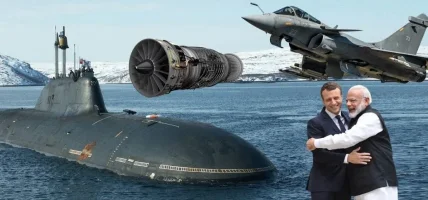India is not in a hurry to ratify the High Seas Treaty, a global agreement for the protection and sustainable use of marine biological diversity in international waters, amid a push from France, the host of the UN Ocean Conference (UNOC-3), for early implementation of the pact.
Ahead of the conference next week, French is keen on the ratification of the Biodiversity Beyond National Jurisdiction Agreement, popularly known as the High Seas Treaty, which was signed by India on the sidelines of the UN General Assembly last year.
The legally binding treaty will come into force 120 days after the 60th country ratifies it. More than 100 countries have signed the treaty, but only 32 have ratified it by this week. Costa Rica is the co-host of the conference to be held at Nice in France.
France is keen on getting it ratified by another 28 countries during the week-long conference beginning June 9, clearing the way for its coming into force.
“The High Seas Treaty cannot be a failure. If we do not seize the opportunity of UNOC-3, we risk wasting precious years for the sustainable management of the ocean,” Thierry Mathou, Ambassador of France to India, told reporters here.
Earth Sciences Minister Jitendra Singh is scheduled to attend the conference and deliver the country statement on June 10.
India is learnt to be studying how the treaty fits with the existing Indian laws such as the Wildlife Protection Act, Biological Diversity Act, Environment Protection Act and state-level marine fishing laws.
“The ratification of the treaty requires it to be approved by Parliament after reviewing the existing laws,” a senior official said.
The treaty also requires countries to set up institutions for implementation and reporting, which will take some time as it involves discussions with experts, local communities and other stakeholders.
The treaty allows countries to enhance strategic presence in areas beyond their Exclusive Economic Zone (EEZ) and utilise the ocean resources for research and generating IP.
Although the high seas cover more than 60 per cent of the ocean, only 1.2 per cent is currently protected. No single country controls these waters and all have the right to use them for navigation, fishing, research and other activities without interference.
The High Seas Treaty, or BBNJ Agreement, was adopted in June 2023 to safeguard marine life and was opened for signatures in September, allowing countries to express their intent to ratify and formally accept the agreement.
The treaty is crucial to meet a globally agreed biodiversity target of protecting 30 per cent of the oceans and lands by 2030, known as “30×30”.
UNOC-3 is being dubbed an important milestone in international efforts for the conservation and sustainable use of oceans.
Calling UNOC-3 a “decisive moment”, Mathou said, “More than ever we need to ensure that multilateral action rises to the challenge of protecting the ocean.” He also said the conference aims to adopt the “Nice Agreement”, which would serve as a “real” international pact for the conservation and sustainable use of the ocean.
The event will bring together around 50 heads of state and government, over 150 ministers and thousands of researchers, scientists, business leaders, activists and civil society members.
The “high seas” or “international waters” are ocean areas beyond any nation’s EEZ and legal jurisdiction. All countries have equal rights to access and use these waters for navigation, fishing, scientific research and other purposes.
Although the high seas make up more than 60 per cent of the world’s oceans, only 1.2 per cent of them are currently protected.





